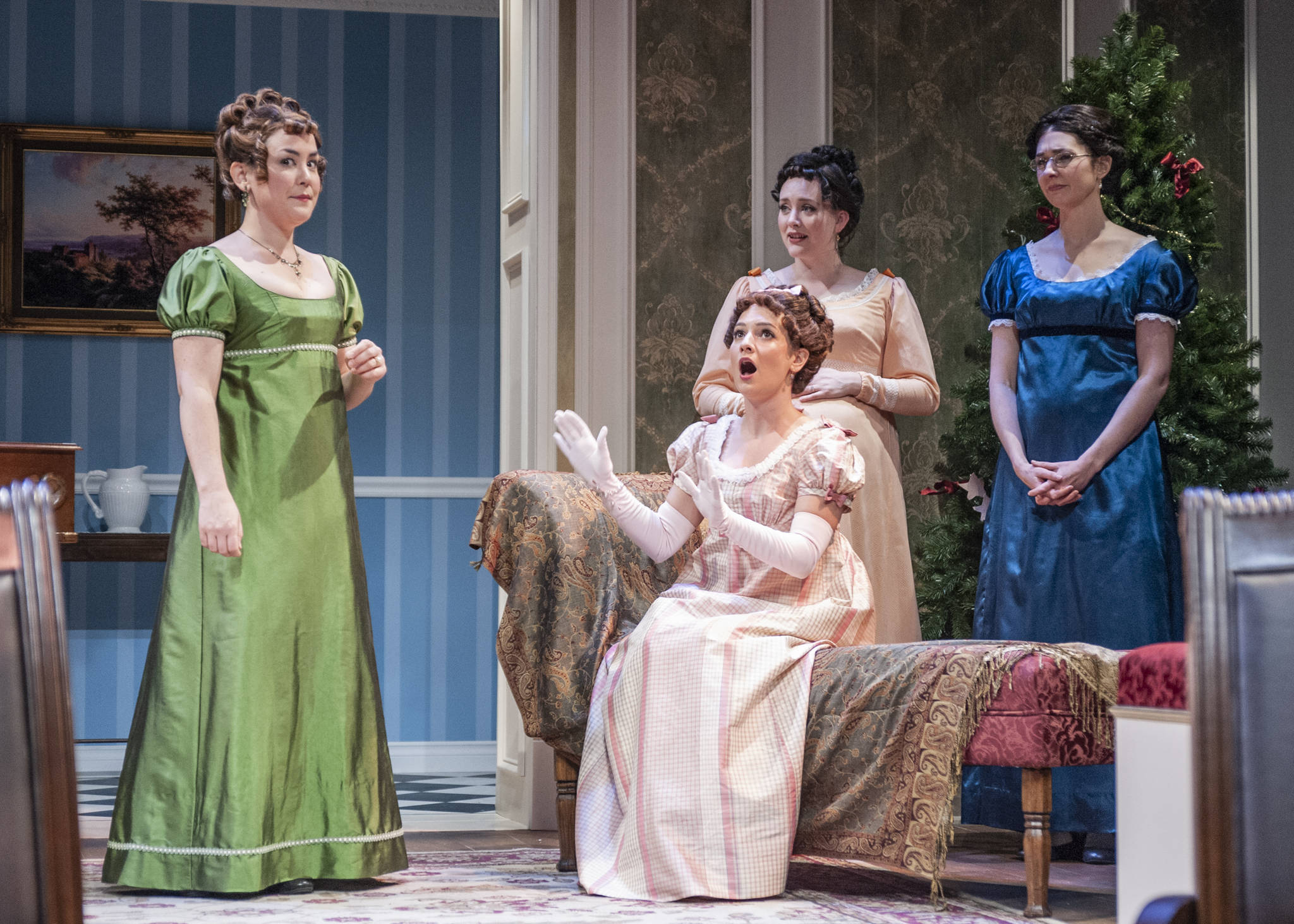Any stage (or screen) conversion of a novel, of course, invites comparison to the visions already in the heads of everyone who’s read it. Jane Austen conversions pose a particular challenge. Because she was so skilled at portraiture, her readers’ visions are that much clearer and harder to compete with. And writing a sequel is just asking for trouble—setting your imagining of the characters’ futures against those of everyone who’s set down one of her books with a satisfied sigh and instantly began to ruminate on what happens next.
Fearlessly, Lauren Gunderson and Margot Melcon attempted both a sequel and a play, following up on Austen’s Pride and Prejudice with Miss Bennet: Christmas at Pemberley, running at Taproot through December 29—but shrewdly focusing on two of the novel’s more difficult characters. (And hedging their bets with a Yuletide setting, knowing this cozy English fantasy backdrop would be as irresistible to Austen audiences as a plum pudding.) The novel’s heroine, Elizabeth Bennet, here just plays hostess to the intrigues of two of her younger sisters: bookish, introverted Mary and shallow, tactless Lydia. Both are rescued, in a way, from their author; Austen conceived each of these women, to be perfectly honest, as maybe about 60 percent person and 40 percent running gag.
At the end of P&P, three of the five Bennet sisters are married off. Two years later, as this play opens, these three and Mary, who has in the meantime remained behind with the folks, gather at Elizabeth’s home. (Catherine, the fifth sister, goes unseen in this play, dispatched on a visit to London.) Mary’s accepted her seemingly inevitable spinsterhood, more or less, but being thrown together with Jane (the eldest) and Elizabeth and their storybook marriages hardly helps. Soon a distant relative pops up: Arthur de Bourgh, Gunderson/Melcon’s own invention and the source of a good deal of comedy regarding his similarities to Mary. (A fascination with giraffes, for instance.) Some Austen plots are propelled by the uncertainty of whom exactly the heroine will end up with; this isn’t one. But even as the destination is never out of sight, the journey is absorbing—particularly thanks to Shanna Allman as Mary, who explores feelingly the part’s extraordinary range: wit, rage, pathos, and subtler but no less affecting attributes like resignation, not to mention every nuance of burgeoning attraction.
Kelly Karcher, as Lydia, is equally splendid in an even trickier role. Gunderson and Melcon pick up Mary, temperamentally, right where Austen left her, but their portrait of Lydia had to show the effects of two years of unhappy marriage—which, when we re-encounter her, haven’t mellowed her, but deepened her sense of entitlement and consequently further weakened her toddler-level capacity for impulse control. But the playwrights allow her to grow, quite movingly, from a vulgar adolescent irritant to a woman who at last squarely faces the truth of her ill-advised choices and even realizes the satisfaction of selflessness—and Karcher convinces at every step.
Naturally the authors bring to bear the skills without which you wouldn’t even bother attempting an Austen sequel: humor, deft plotting, lively dialogue. But the show’s most impressively Austenian traits are its unlabored flow and polish, leaving no clumsinesses or implausibilities to stumble over (misunderstandings are cleared up quickly, not left hanging for plot-prolonging purposes) and no jarring inconsistencies with—well, my conceptions of the characters, at any rate. Perhaps the highest praise of Miss Bennet is that it never calls attention to how difficult it must have been to pull off.
Miss Bennet: Christmas at Pemberley
Thru December 29 | Taproot Theatre | $25–$52 | taproottheatre.org








